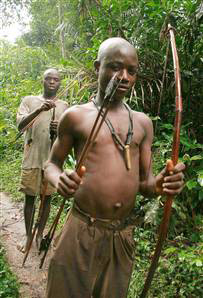Originally published in "Hunter-Gathers of the Congo Basin: Cultures, Histories, and Biology of African Pygmies" (2014, 1st ed.) edited by Barry S. Hewlett, pages 219-244. https://doi.org/10.4324/9780203789438
Jerome Lewis's Academic Profile: https://www.ucl.ac.uk/anthropology/people/academic-and-teaching-staff/jerome-lewis
Some excerpts:
Demand-sharing is the core practice that ensures egalitarian economic relations. In contrast to the donor-organized sharing familiar to most people, where the person owning the resource dispenses it according to their whim, demand-sharing is recipient controlled. Potential recipients constantly demand shares of things they suspect may be around. It is the donor’s duty to give whatever they are requested; refusal is impolite even offensive. This is crucial to prevent sharing being manipulated to the donor’s advantage.
As I hope my discussion of sharing illustrates, egalitarianism is not a passive state. It is an assertive, dynamic process that depends on a complex of interdependent practices that constantly resist the emergence of hierarchy, dependency, and inequality. Like demand-sharing, two key mechanisms that assure egalitarianism are mobility and “avoidance strategy” (Woodburn 1982). Rather than confront someone who is trying to oblige you to do something, or seeks to exert authority over you, or with whom you have a dispute, move away from them. Because adults do not depend on others for access to vital resources, they can simply and easily move away. If mobility is a leveling mechanism, it depends on this absence of dependency. Mbendjele encourage mobility from an early age. Children that can walk can chose where they sleep, and some often spend the night with other kin or friends rather than with their parents. When people leave a camp, they give no public reason. As they leave, those remaining sometimes say “duaké! ”—“Go!”
The implicit valuation of equality between members of the group can result in some surprising behavior from an economic perspective. Men are very sensitive to who is provisioning the camp with meat. Individuals who hunt a lot will become a target for teasing and mockery, even cursing, if people perceive that the group is eating their production too often. In contrast to models of economic behavior that assume that good producers will get recognition, status, and fame, here it is not the case. They stop hunting for a while rather than be subjected to teasing, gossip, and jealousy. I have described a man who was an obsessive hunter (Lewis 2003). Despite repeated calls for him to stop hunting so much, he continued. Eventually the women of his camp formed a coalition that refused to cook any meat that he killed. This was so offensive that he left to live with neighboring Luma Pygmies where he remains to this day. In effect, the women exiled him for producing too much.
An Mbendjele woman or man does not depend on anyone for direct and unrestricted access to food and their basic needs. Men cannot control women’s labor nor the yield of women’s labor. Neither can they control the destination of women in marriage because they cannot oblige a woman to marry anyone against her wishes, and a woman wishing to divorce a man simply leaves him without any requirement to justify herself. Such an absence of dependency is the necessary prerequisite for egalitarian relations (Woodburn 1982). A person can exert power over others only to the extent that he can withhold basic requirements such as food and shelter, access to key resources, or marriage partners.
Yes! I was actually inspired to post this article here when I saw it in the bibliography of one of the episodes.

